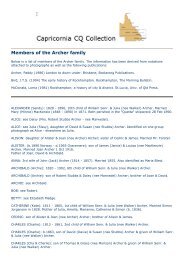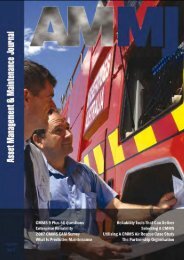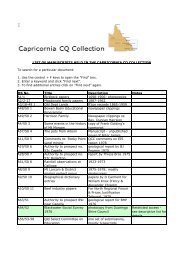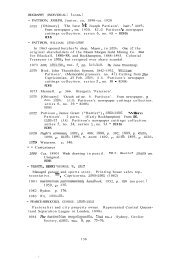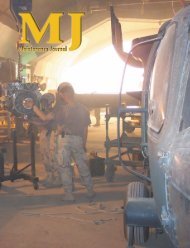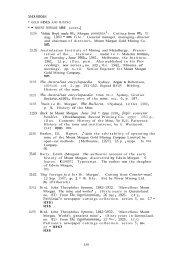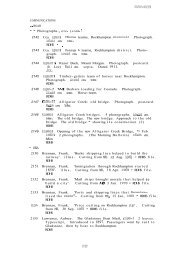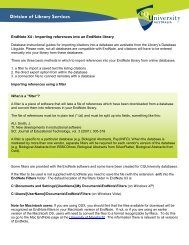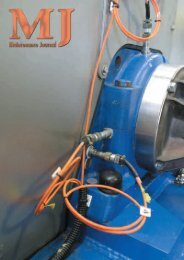August 2005 - Library
August 2005 - Library
August 2005 - Library
Create successful ePaper yourself
Turn your PDF publications into a flip-book with our unique Google optimized e-Paper software.
Day Two: Tuesday 25, October <strong>2005</strong><br />
Carlton Crest Hotel, Melbourne<br />
9.00 Opening Remarks from the Chair<br />
Bill Holmes, Director Facilitator of the Industrial Maintenance<br />
VIC/TAS SIRF ROUNTABLES<br />
9.10 Default Elimination and its Relationship to Proactive<br />
Behaviour for Best Practice Contract Management<br />
The only way to truly reduce maintenance cost is to eliminate<br />
the work, identify the repeating faults and prevent them from<br />
occurring again. But tensions arise in how to do this in a<br />
contract environment where reduction in work may not be in<br />
the interest of the contractor. Through the SIRF Roundtables<br />
Bill has seen many approaches to contract maintenance and<br />
will share the insights he has gained on:<br />
■ Developing an Incident Management System (IMS) to<br />
quantify and track success<br />
■ Defect elimination to encourage and reward proactive<br />
behaviour<br />
■ Reviewing key factors in the success of implementation of<br />
an IMS<br />
Bill Holmes<br />
VIC/TAS Facilitator of the Industrial Maintenance Roundtable<br />
SIRF ROUNDTABLES<br />
9.50 Working with Contractor Constraints to Deliver<br />
Maintenance Objectives in Times of Skills Shortages<br />
As maintenance manager of Campbell’s Shepparton plant,<br />
Peter has had extensive experience in securing reliable and<br />
qualified maintenance services in a regional environment<br />
where skills shortages are a significant consideration. In this<br />
session, he will share his experiences on:<br />
■ Implementing qualification specific clauses to ensure<br />
maintenance expectations are delivered<br />
■ Effective management of contractors and sub-contractors<br />
■ Maintaining relationships through times of conflict and<br />
contractor underperformance<br />
■ Working with contractor constraints to achieve performance<br />
in the skills shortage climate<br />
Peter Watkins, Maintenance Manager<br />
CAMPBELL’S SOUP<br />
10.30 Morning Tea<br />
11.00 Achieving Best Practice in the Performance Management<br />
of Maintenance Services<br />
The Facilities Services Branch (FSB) of the Department of<br />
Education (TAS) has decided to review its outsourced<br />
maintenance services to address unsatisfactory performance.<br />
With this new system up and running, Les will share the<br />
experiences in developing this new service delivery model and<br />
managing the performance of maintenance contractors.<br />
■ Creating a service delivery model that is targeted to<br />
organisational needs and constraints<br />
■ Focussing KPIs to drive performance<br />
■ Creating objective reporting standards and systems<br />
■ Communication and contract management within a<br />
complex contractual and organisational structure<br />
■ Realising cost-effective service performance<br />
Les Burbury, Coordinator Facilities Management<br />
DEPARTMENT OF EDUCATION (TAS)<br />
11.40 Identifying the Appropriate Service Delivery Model for Your<br />
Organisation to Drive Productivity<br />
Maintenance of TransAdelaide’s rail car assets has recently<br />
been reviewed and the contract subsequently re-tendered to<br />
reflect the need to change service delivery models to optimise<br />
performance. This session explores the process of defining<br />
what the important parameters of the maintenance needs were<br />
and the development of a contract that could deliver the<br />
required services.<br />
■ Understanding crucial organisational goals and constraints<br />
as important influences on maintenance needs<br />
■ Harnessing appropriate service delivery models to<br />
maximise maintenance output<br />
■ Assessing the impact of budget in deciding on service<br />
delivery models<br />
■ Effective alignment of service delivery to your organisation<br />
■ Streamlining maintenance communication processes to<br />
remove impediments and excuses for delays in contractor<br />
performance<br />
Jim Sandford, Contract Manager<br />
TRANSADELAIDE<br />
12.20 Lunch<br />
1.40 Harnessing Contractor Proficiency to Add Value to<br />
Maintenance Systems<br />
After beginning a maintenance career with the Royal Australian<br />
Navy, Ron has had over fifteen years experience in the area of<br />
maintenance. He currently manages the maintenance<br />
operations for three Air Liquide plants. From his extensive<br />
experience with contract maintenance he will share:<br />
■ Engaging contractors through participation in decisionmaking<br />
and priority systems<br />
■ Developing specific KPIs and effective reporting<br />
mechanisms to enable performance management<br />
■ Using incentives to reinforce contractor performance<br />
■ Effective reporting to support contractor independence<br />
while maintaining control<br />
Ron Churchill, Maintenance Manager<br />
AIR LIQUIDE<br />
2.20 Making the Marriage Work and Managing Contractor<br />
Relationships<br />
Facilitator: Bill Holmes, Director<br />
SIRF ROUNDTABLES<br />
Panellists:<br />
Peter Watkins, Maintenance Manager<br />
CAMPBELL’S SOUP<br />
Jim Sandford, Contract Manager<br />
TRANSADELAIDE<br />
Ron Churchill, Maintenance Manager<br />
AIR LIQUIDE<br />
Peter Gregory, Maintenance Contract Coordinator<br />
WOODSIDE ENERGY<br />
3.20 Afternoon Tea<br />
3.40 Implementing Cohesive Continuous Improvement<br />
Strategies and Managing Non-Performance Issues<br />
With over twenty years experience in maintenance and<br />
contract management, Peter adopts a relationship focus to<br />
contract management to manage conflicts and drive<br />
performance. He will impart his insights on:<br />
■ Building reciprocity and trust as supportive planks to<br />
contractual performance<br />
■ Using open communication to ensure speedy performance<br />
in practice<br />
■ Fostering effective communication of organisational<br />
expectations and realised responsive performance<br />
■ Managing non-performance issues without resorting to<br />
legal dispute<br />
Peter Gregory, Maintenance Contract Coordinator<br />
WOODSIDE ENERGY<br />
4.20 Closing Remarks from the Chair<br />
4.30 Close of Conference<br />
To Register | T (02) 9223 2600 | F (02) 9223 2622 | E registration@iqpc.com.au | Visit www.iqpc.com.au/MaintenanceIQ



